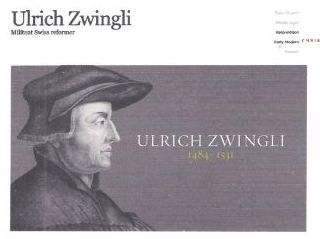










Ulrich Zwingli has been called the third man of the Reformation; third behind Martin Luther and John Kalvin. Ulrich was a scholar, priest and reformist.
Ulrich was born a couple of months after Martin.
Ulrich graduated from the University of Basel in 1506. and became the parish priest in Glarus. From the beginning he took his priestly duties seriously. The feeling of responsibility motivated him to show an increasing interest in the Bible. He bought a copy of Erasmus’s New Testament Latin translation He began to teach himself Greek and bought Erasmus Greek N.T. and started to memorize long passages. Privately he started to challenge the customs of medieval Christendom he thought were unbiblical.
Ulrich moved to Zurich in 1518 just a year after Martin Luther began the Reformation in Germany with his famous 99Theses. Ulrich had his own equivalent the 67 conclusions.
He struggled with celibacy. He secretly married in 1522.
In January 1523 he was ready to share his ideas. Before the Zurich City Council he gave the what is now called the FIrst Disputation. The second Disputation happened in October. The reforms which followed were the removal of images of Jesus and Mary, saints removed from churches, the Bible to have preeminence. In 1524 he was publicly married. In 1525 he and others convinced the city to abolish mass and replace it with a simple service that included the Lord’s Supper but only as a symbolic memorial.
Under the leadership of Ulrich the Swiss Confederation was creating a parallel movement to what Martin Luther was creating in Germany.
The German Prince Philip of Hesse saw the potential of an alliance between Ulrich and Martin. In 1529 they met at his castle - now known as the Colloquay of Marlburg . The two movements agreed on 14 points of doctrine, the 15th point they disagreed over the Lord’s Supper. Luther preached consubstantiation - actual body and blood of Christ, Ulrich said it was only representative and memorial. It was evident no alliance was going to work.
Ulrich died two years later in a battle defending Zurich against Catholic forces.
Under Heinrich Bullinger, Ulrich’s successor, this unique branch of the Protestant Reformation continued to blossom.
Something went wrong, please try again later.
This resource hasn't been reviewed yet
To ensure quality for our reviews, only customers who have downloaded this resource can review it
Report this resourceto let us know if it violates our terms and conditions.
Our customer service team will review your report and will be in touch.